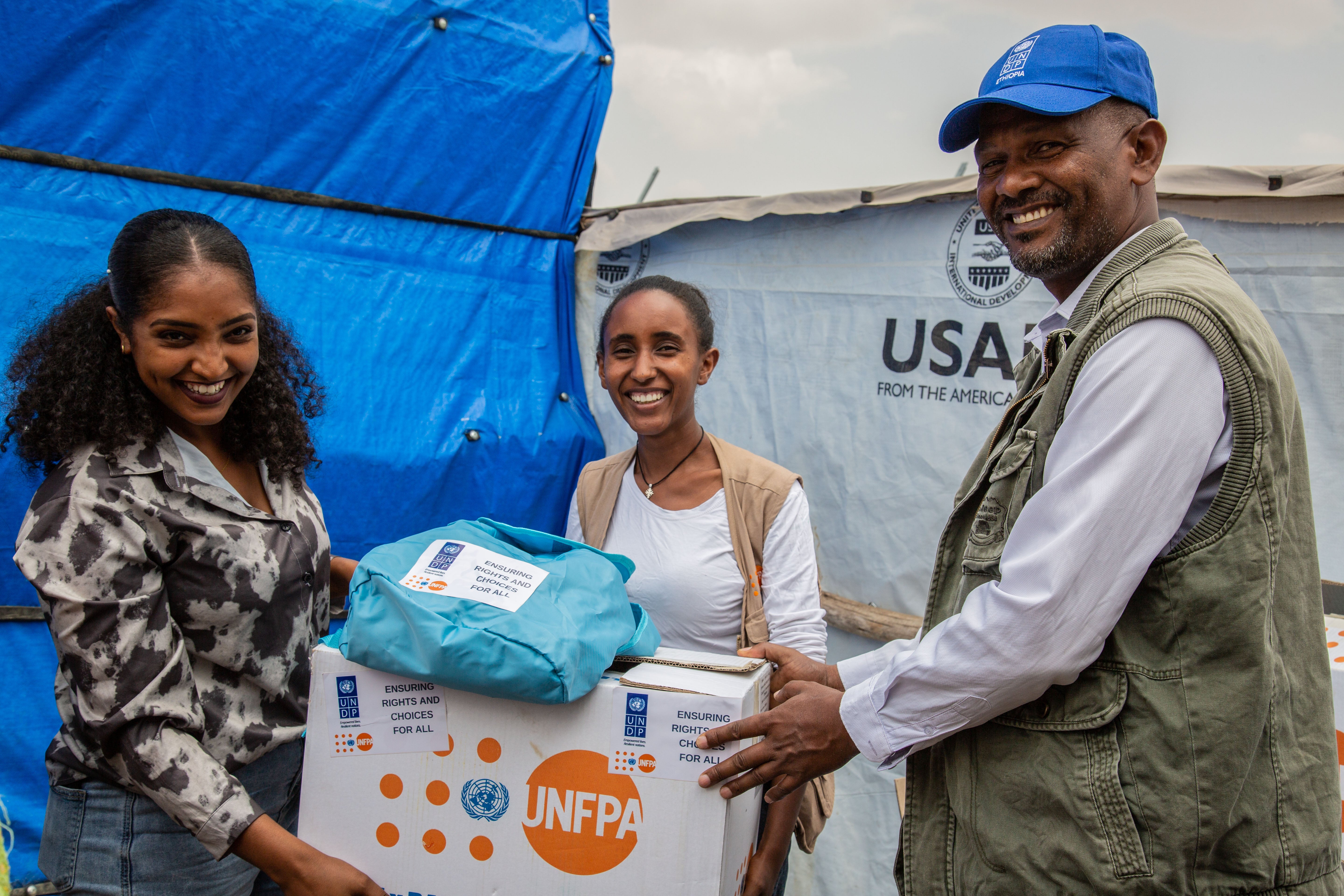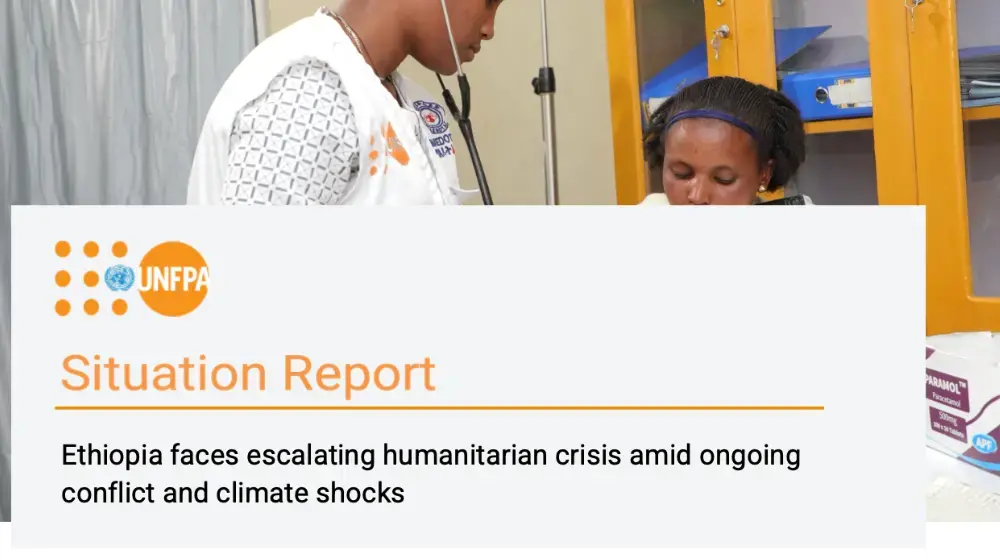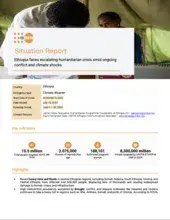MEKELLE, Tigray - “I couldn’t go out of my tent during my period as I don’t have other clothes to change into. The dignity kit has helped restore my mobility and dignity and also prevent my baby from getting scabies”, says Tiemti Adugna, 24-year-old, mother of two children who stays at Sabacare 4, an internally displaced camp on the outskirts of Mekelle, Tigray.
During the conflict, Tiemti was forced to leave her home with only the clothes on her back. Overwhelmed by financial constraints, she often struggles to obtain essential items to cater for basic needs, including soap, menstrual hygiene supplies, and basic clothing items, which are needed to maintain her personal health and dignity.
“I can’t afford to buy pads or soap. I can hardly provide daily food for my two kids. When you don’t have any income, something as natural as one’s menstrual period becomes a hassle. Every income I get goes to feed my family” says Tiemti.
Across northern Ethiopia, the long-standing conflict has rendered a total of 9.4 million people in need of humanitarian aid across the three conflict-affected regions in northern Ethiopia. Among those IDPs, more than half are women and girls of reproductive age with a high need for special health and hygiene and protection from gender-based violence.
The basic needs of every woman
In crisis situations, maintaining proper hygiene is a common problem in displaced communities. Forced to live in overcrowded rooms shared by many families and with limited access to water facilities and hygiene products, women and girls endure ordeals during their monthly periods.
“I didn’t know where to put my clothes to dry while hiding them from the other members of the community,” says Mulu Migbel, 17, when asked about her menstrual health management at the camp.
“There is no soap or shampoo, even water is scarce. Many kids have developed scabies and other skin problems as a result of this. It’s complicated to stay healthy,” says Tiemti to UNFPA.
In Amhara and Afar, accessing personal hygiene products was particularly challenging to access due to the expansion of the conflict and its movement restrictions, including the provision of much-needed assistance by partners.
“As a person living with a disability, I have encountered many challenges in trying to access dignity products for my personal hygiene”, says Fatoumata Mehari, affected by the conflict in the Afar region upon receiving her dignity kit. “I was not able to move anywhere. We were isolated. Some materials were a luxury amid the crisis”.
Across northern Ethiopia, months of conflict have caused a shortage of hygiene supplies with widespread health consequences. Amid growing needs, more than 17,500 dignity kits have been sent to improve the situation of women and girls across the Afar, Amhara, and Tigray regions.
More than a Dignity Kit
The dignity kits offer more than basic hygiene necessities like soap, detergent bars, and menstrual hygiene supplies such as sanitary napkins and basic clothing for women and girls. They also include a whistle and torch to mitigate the risk of sexual assault or abuse during nighttime at displaced camps.
They are also a vital opportunity for UNFPA staff and partners to meet displaced women, assess their physical and psychosocial well-being and also raise awareness of the reproductive health and gender-based violence services being made available.
“Dignity kits’ distributions go hand in hand with orientation sessions on the various types of violence against women and where to get help if need help. They provide critical information and are an entry point for further services”, explains Ms. Fathema Sultana, UNFPA GBV Specialist in Tigray.
These sessions are conducted regularly in Women and Girl's Safe Spaces located at internally displaced camps (IDP) sites and facilitated by trained community outreach personnel.
“The dignity kit and the awareness session help displaced women and girls to access critical information about their rights and create a peer-to-peer support network within the camp against gender-based violence. This shared space and knowledge gives them the strength to uplift their voices against any threat, harm or violence”, explains Mr. Yirga Gebreegzahiher, Regional Manager of the Organization for Social Services, Health, and Development (OSSHD), UNFPA partner in the region and in charge of the distribution of kits in Mayweiny IDP camp in Mekelle.
Restoring dignity as ‘One UN’
To respond to the increasing needs and despite the many challenges faced over the last months, UNFPA in partnership with UNDP have responded as ‘One UN’ to distribute more than 17,500 dignity kits to help displaced women and girls regain a sense of dignity, a semblance of normalcy amid the crisis in northern Ethiopia.
“Partnerships are at the heart of everything we do as UNDP. In this project, we worked with our sister agency, UNFPA, to deliver a coherent, effective, efficient and much-needed support to conflict-affected women and girls in northern Ethiopia, helping them to reclaim their dignity through access to essential supplies that helped them maintain proper hygiene even in adverse conditions. Creating shared opportunities and leveraging on our respective assets to bring value to communities is what the UN system is about” says Dr. Cleophas Torori, UNDP Deputy Resident Representative.
UNFPA and UNDP have combined their strengths to protect women and girls from potential hygiene and health problems but also improve their psychosocial and physical well-being after months of conflict. This interagency cooperation stands as an example of a context-driven, coherent, timely, flexible, and result-oriented approach to responding to the ever-changing challenges faced across Ethiopia.
"We worked together with UNDP and OSSHD, joining forces to help displaced women restore their dignity during these difficult times", says Bruno Husquinet, UNFPA Head of Sub-Office in Tigray.
“I am grateful. Thanks to the dignity kits, I can live freely and healthily. I can protect myself and my children from health problems”, says Tiemti joyfully.

Caption: Programme officers of the Organization for Social Services, Health, and Development (OSSHD), UNFPA, and UNDP during the distribution of dignity kits at Sabacare 4, the internally displaced camp on the outskirts of Mekelle, Tigray. Photo by © UNFPA Ethiopia, Paula Seijo.





